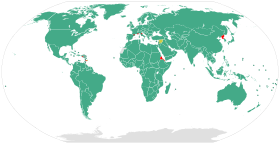Anti-corruption
Embezzlement, cronyism, nepotism, and other strategies of gaining public assets by office holders were not yet constructed as unlawful or immoral, as positions of power were regarded a personal possession rather than an entrusted function.[6] Especially in diplomacy and for international trade purposes, corruption remained a generally accepted phenomenon of the political and economic life throughout the 19th and big parts of the 20th century.It is hence more reduced than other treaties on restricting corruption, to increase – as the working group's chairman Mark Pieth explained – the influence on its specific target.[17] Empirical research by Nathan Jensen and Edmund Malesky suggests that companies based in countries that ratified the convention, are less likely to pay bribes abroad.[19] Groups like TI, however, also questioned whether the results of the process are sufficient, especially as a significant number of countries is not actively prosecuting cases of bribery.The draft on an international agreement on illicit payments proposed in 1979[21] by the United Nations Economic and Social Council did not gain traction in the General Assembly, and was not pursued further.[22] When the UN Office on Drugs and Crime (UNODC) presented its draft of the United Nations Convention against Corruption (UNCAC) in 2003, it proved more successful.Even before adoption of Anti-Corruption Strategy and implementation plan, after 2018 Velvet Revolution, number of criminal investigation cases of corruption almost doubled in Armenia.The campaign was primarily led by the Central Commission for Discipline Inspection (CCDI), an internal body of the Communist Party and secondarily by the People's Procuratorate.From 2003 to 2012, Georgia moved from one of the ten most-corrupt countries based on Corruption Perceptions Index rankings to among the top third for clean government.Anti-corruption reforms implemented by president Mikheil Saakashvili resulted in the firing of all 16,000 traffic police officers in a single day, simplification of government bureaucracy, and university entrance based on standardized exams rather than interviews.[53] After signing the OECD-Convention on Combating Bribery of Foreign Public Officials,[54] Japan implemented the Unfair Competition Prevention Act (UCPA) to comply with the convention.[56] Heimann and Pieth are arguing that British policy makers supported the Bribery Act to overcome the damage in reputation caused by the Al-Yamamah deal.Zephyr Teachout argued that giving and receiving presents held an important role in diplomacy but were often seen as potentially dangerous to a politician's integrity.Less frequently laws to prosecute corruption through auxiliary criminal activities include the Mail Fraud Statute and the False Statements Accountability Act.[48] In 2011 the American Anti-Corruption Act was drafted, written in part by former Federal Election Commission chairman Trevor Potter, with input from dozens of strategists, reformers and constitutional attorneys from across the ideological divide, as a type of model legislation to limit or outlaw practices which contribute to political corruption.[63] The idea was to craft a blueprint law that could be adapted by numerous jurisdictions at the state and local levels that was consistent with the current constitutional structure and that would make it easier to identify and limit political corruption.[1] The concept of good governance can accordingly be applied to increase the integrity of administrations, decreasing hence the likelihood that officials will agree on engaging in corrupt behavior.Gong Ting and Xiao Hanyu for instance argue that citizens, who have a positive perception of state institutions are more likely to report corruption-related incidents than those, who express lower levels of trust.[71] the involved MDBs are typically applying an administrative process that includes judicial elements, when a suspicion about corruption in regard to the granted projects surfaces.In case of identifying a sanctionable behavior, the respective authority can issue a debarment or milder forms, e.g. mandatory monitoring of the business conduct or the payment of fines.[72] Excluding companies with a track record of corruption from bidding for contracts, is another form of sanctioning that can be applied by procurement agencies to ensure compliance to external and internal anti-corruption rules.Such step should according to anti-corruption scholars Adam Graycar and Tim Prenzler include precisely and unambiguously worded rules, a functional protection and support of whistleblowers, and a system that notifies supervisors early about the potential dangers of conflicts of interest or corruption-related incidents.[75] More over, Bertot et al. (2010) extended the list of potentially involved agents of civil society by introducing the notion of decentralized, non-formally organized anti-corruption activism through social media channels.[40] An example for a more inclusive approach to combating corruption that goes beyond the framework set by lawmakers and the foremost role taken by representatives of the civil society is the monitoring of governments, politicians, public officials, and others to increase transparency.Examples for such publications are the rules and suggestions provided by the International Chamber of Commerce (ICC), the World Economic Forum (WEF), and TI.In this field of anti-corruption activism, representatives of the civil society are often taking a different stance than in other areas, as they are regularly consulted for assisting administrations with their respective expertise and are hence enabling state actions.[87] According to Transparency International, "collective action is necessary where a problem cannot be solved by individual actors" and therefore requires stakeholders to build trust and share information and resources.[99] Sylvie Bleker-van Eyk from VU University Amsterdam sees value in the implementation of strong compliance departments in the respective company.[102] Such shift in culture can be implemented through and accompanied by exemplary behavior by top management, regularly conducted training programs on anti-corruption and a constant monitoring of the development in those sections.

-
Ratifiers
-
Signatories
-
Not signed
-
Others
Anti-corruption (disambiguation)Political corruptionBriberyCensorshipPolitical repressionPolitical violenceCronyismEconomics of corruptionElection interferenceElectoral fraudElite captureInfluence peddlingInsider tradingKleptocracyMafia stateNepotismPolitically exposed personPyrrhic defeat theoryRevolving doorSlush fundSimonyState captureState-corporate crimeThrofferInternational Anti-Corruption CourtGroup of States Against CorruptionInternational Anti-Corruption AcademyInternational Anti-Corruption DayUnited Nations Convention against CorruptionAngolaBotswanaBurkina FasoCameroonCape VerdeCentral African RepublicComorosDemocratic Republic of the CongoEquatorial GuineaEritreaEthiopiaGuinea-BissauLesothoLiberiaMalawiMauritiusMoroccoNamibiaNigeriaSenegalSierra LeoneSomaliaSouth AfricaSouth SudanTanzaniaTunisiaUgandaZambiaZimbabweAfghanistanArmeniaAzerbaijanBahrainBangladeshBhutanBruneiCambodiaCyprusEast TimorGeorgiaIndonesiaIsraelJordanKuwaitKyrgyzstanKazakhstanLebanonMalaysiaMaldivesMyanmarNorth KoreaPakistanPhilippinesSingaporeSouth KoreaSri LankaTaiwanTajikistanThailandTurkeyTurkmenistanUzbekistanVietnamAlbaniaAndorraAustriaBelgiumBosnia and HerzegovinaBulgariaCroatiaCzech RepublicDenmarkFinlandFranceGermanyGreeceHungaryIcelandIrelandKosovoLatviaLiechtensteinLithuaniaLuxembourgMoldovaMonacoMontenegroNetherlandsNorth MacedoniaNorthern IrelandNorwayPolandPortugalRomaniaRussiaSan MarinoSerbia